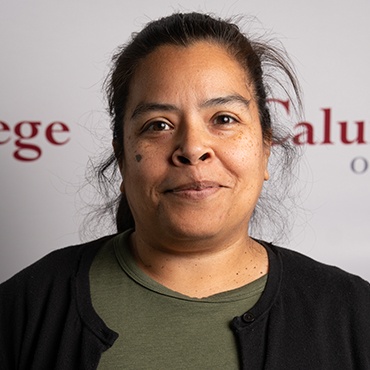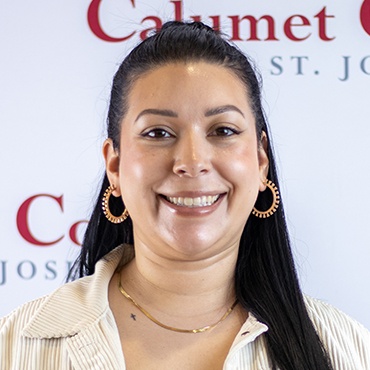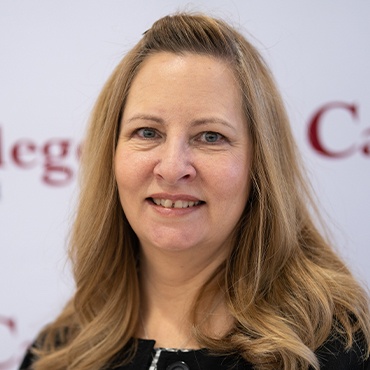Academic Advising

The Office of Academic Advising is here to assist you in selecting and registering for your courses, as well as to discuss the program requirements for your major. We also assist you in finding the various resources on-campus to help you excel in college (such as tutoring with Academic Support Services or internship assistance with Career Services).
Tips
- If you are within your last year of graduating, you must complete a graduation application along with your final selection of courses in order to begin your graduation process. This process is not automatic.
- Graduation occurs three times a year (December, May, and August), but the Commencement exercise is only once a year in May.
- If you have attended other colleges or universities, make sure you have sent for official copies of your transcripts.
- If you cannot locate a copy of your academic plan, contact the Office of Academic Advising for a copy so that you can appropriately plan your schedule.
- When selecting your classes, make sure you have taken the prerequisites first.
- Keep your CCSJ catalog; it contains many answers to your questions.

About Academic Advising
Frequently Asked Questions
It is a course you need to take before you take another course. For example, you need to take CRIJ 100 (Introduction to Criminal Justice) before you take CRIJ 370 (Juvenile Delinquency.) The college catalog lists course descriptions and prerequisites. When selecting your classes, make sure that you have taken the prerequisite first.
No-especially in your major. Most (but not all) general education courses are offered every semester. You should make a plan to schedule your major classes.
It is your “roadmap” for each course. The requirements, attendance policies, assignments, and test dates are usually on it.
You should attend every class to get the most for your money and education! Class attendance may be a requirement by your instructor. If you are ill, please call or e-mail your teacher in advance.
During the first week of classes, you can find copies of the room assignments on the security desk. You can also stop by the office of Academic advising to inquire at any time.
Calumet College of St. Joseph has its roots in the liberal arts. By taking courses in a variety of subjects, you will become a well-rounded person.
Some students refer to the catalog as the college Bible. The catalog lists all of the course requirements, descriptions, policies and procedures. This book is your contract with the college. Keep your CCSJ catalog. It has the answers to your questions.
The first step is to make sure that you have sent for an official copy of your transcripts. Ask the Registrar’s office for details. After the Registrar evaluates your transcripts we can help you determine how those credit hours fulfill CCSJ requirements.
When you withdraw from a course a “W” is placed on your transcript next to the course. When you drop a course it is removed from your transcript completely. You can only drop a course during the first week of class or if you have never attended the class.
21st Century Scholars receive eight full-time semesters of funding. Please consult with your Academic Advisor for further details.
Graduation
APPLYING TO GRADUATE
Preparing for graduation is a very exciting time for students and one of the most important steps in preparing for graduation is completing your application for graduation. Please keep in mind that the graduation process is not automatic and before you can be listed as a degree candidate, you must complete your application for graduation (which includes the graduation checklist). This should be completed by the deadline stipulated in the Schedule of Classes which is always at the beginning of the last semester of your current program.
Below are the directions for completing your graduation checklist and applying for graduation:
- Log into your MyCCSJ account
- Under Student Records go to Graduation Checklist
- You will then see steps including Review Personal Information, Review Student Record Information, Review Student Billing Account, and Apply for Degree
- You must review all steps before you can proceed with applying for your degree. You will also be required to submit payment of your graduation fee, therefore, if you are unsure if you are ready to complete your graduation application or if you have taken a break in your program and would like to find out what you should do to stay on track for graduation, please contact the Office of Academic Advising.
- Once your application for graduation has been completed, you will receive a confirmation email to your CCSJ email account within 7 days informing you that you have been added to the graduation list as a degree candidate. Your application for graduation status will also show as Accepted. Please remember that being a degree candidate indicates that you have approached the final phase of your degree requirements. You must still pass all required courses in order to remain on that graduation candidate list. If you are not eligible to be listed as a degree candidate, you will receive an email with those details as well.
Additionally, a graduation packet with details about the May commencement ceremony and other graduation events will be provided in January.
DEADLINE FOR GRADUATION
Friday, February 24, 2023 for May and August Graduates.
Preparing for graduation is a very exciting time for students and one of the most important steps in preparing for graduation is completing your application for graduation. Please keep in mind that the graduation process is not automatic and before you can be listed as a degree candidate, you must complete your graduation checklist and application. Students who do not complete the application for graduation by the specified date will not be awarded/degreed until the next graduation term. Log into your MyCCSJ account to complete your graduation checklist and apply for graduation.
You must complete the following steps under Graduation Checklist to apply for graduation:
- Review Personal Information
- Review Student Billing Account
- Apply for Degree
SAP Policy and Appeal Form
When you receive federal or state financial aid, federal guidelines require that you make real and measurable progress toward your degree in order to continue to receive federal or state financial aid. This requirement is called Satisfactory Academic Progress (SAP).
The Satisfactory Academic Progress Policy addresses your academic progress during all your terms of enrollment at Calumet College, including summer, whether or not you receive financial aid during the terms. At Calumet College, this policy applies to federal, state, and institutional aid, including federal loans. Note that institutional aid programs may have specific eligibility or renewal requirements in addition to the minimum requirements of the Satisfactory Academic Progress Policy.
Satisfactory Academic Progress (SAP) Policy
Effective date July 1, 2011
Federal legislation governing all federal financial aid programs requires that students receiving federal financial aid make satisfactory academic progress (SAP) toward a degree in order to maintain eligibility for this aid. It is the policy of Calumet College of St. Joseph that all recipients of all financial aid programs, including state and institutionally funded programs, are subject to the same satisfactory academic progress standards as those for federal financial aid.
CCSJ defines the Academic Year for traditional undergraduate programs in terms of credit hours in standard terms. The minimum definition of an academic year for an undergraduate traditional or undergraduate accelerated program would be 24 credits taken over 30 weeks of instruction. The minimum definition of an academic year for a graduate program would be 18 credits taken over 30 weeks of instruction. Payment periods are determined by terms. CCSJ does offer accelerated Degree Completion undergraduate programs and Graduate Programs that use modules through a cohort structure; however, those modules are framed within a standard term definition. All 3 program types; traditional undergraduate, accelerated undergraduate, and graduate programs, are structured using similar semester start and end dates within a 2-week variance.
Satisfactory academic progress at CCSJ is monitored:
- at the end of fall semester traditional coursework,
- at the end of each intersession,
- at the end of the fall semester modular coursework,
- spring semester traditional coursework
- spring semester modular coursework
- summer semester traditional coursework
- summer semester modular coursework.
- Graduate runs at the end of fall/spring and summer semesters
- At the time of readmission for a student returning for the same degree level
As grades and module timeframes closely mirror standard term timelines, module classes and programs are also monitored at the end of each intersession, spring, and summer semester. All modular classes are structured within standard academic term lengths, so no exceptions are necessary. All SAP standards are reviewed based on all classes in all semesters taken at CCSJ. Additionally, all accepted transfer credits from regionally accredited colleges and universities as well as developmental credits taken at CCSJ are included in the calculation of the Percentage of Credits Completed or Pace Standard.
If a student changes majors or seeks to earn dual major degrees, the calculations remain the same. However, if a student receives a bachelor’s degree or master’s degree, the calculations will start over for the new degree the first semester attended following original degree completion. (Please note: SAP standards are the minimum criteria for maintaining financial aid eligibility. Certain forms of financial aid may carry other requirements for renewal.) All periods of the students’ enrollment, even periods in which the student did not receive FSA funds and meet these standards, are the same for students who are not receiving Title IV aid. Components must be as strict or stricter as the policy the institution applies for those students not receiving Title IV aid.
SAP consists of three required components:
- Qualitative Standard (Cumulative GPA or CGPA)
All undergraduate students are required to maintain a 2.0 CGPA and graduate students are required to maintain a 3.0 CGPA. All programs adhere to these CGPA limits. Any student falling below that standard for any enrolled term will be placed on SAP (Financial Aid) warning. If a student continues below the standard in a subsequent term, that student will be placed on SAP (financial aid) suspension and will not qualify for any form of financial aid. For programs greater than two academic years, CCSJ will check the qualitative measure at the end of the second academic year (student must have a “C” or its equivalent or have an academic standing consistent with the institution’s requirements for graduation). Institutional Research will run this report after each semester. Those that are not meeting standard will be contacted by Academic Advising. The student will be placed on SAP (financial aid) suspension and will not qualify for any form of financial aid. - Quantitative Standard (Pace)
The student’s pace or rate of completion is evaluated after each enrolled term by dividing the cumulative credit hours earned by the cumulative credit hours attempted showing in the enrolled column on the unofficial transcript. Students are required to maintain a rate of completion at a minimum 67% to meet SAP (Financial Aid) standards. Retake courses will count toward both the CGPA and toward credit hours attempted. Withdrawals and incompletes do not count toward a student’s CGPA but do count toward credit hours attempted. Transfer hours accepted toward completion of a student’s program count as both credit hours attempted showing in the enrolled column on the unofficial transcript and credit hours earned.
Below are examples of Pace calculations:
| Cumulative Earned Hours / | Cumulative Attempted Hours = | Percentage of Completion | Pace standard of 67% met? |
| 12 | 12 | 100% | Yes |
| 11 | 12 | 91.6% | Yes |
| 10 | 12 | 83.3% | Yes |
| 9 | 12 | 75% | Yes |
| 8 | 12 | 66.6% | No |
| 7 | 12 | 58.3% | No |
- Maximum Time Frame Standard
Students are expected to complete all academic requirements for a degree within 150% of the published length of the educational program in which the student is enrolled. Accepted transfer credit hours and consortium agreements are included in the calculation of the Maximum Time Frame Standard. Developmental credits do not count in this component.
Below are examples of Maximum Time Frame requirements:
| Required Hours to Complete Degree | Maximum Attempted Hours | |
| Associate | 58 – 60 | 87 – 90 |
| Bachelor | 118 – 120 | 177 – 180 |
| Master | 36 – 67 | 54 – 101 |
SAP Evaluation
- SAP is calculated at the end of each fall, intersession, spring, and summer semester for all 3 components: qualitative GPA, quantitative Pace and Maximum Timeframe.
- Students meeting the standards listed above when calculated will be in SAP good standing.
- The first semester a student does not meet either the CGPA or Pace standard or both, the student will be placed on SAP (Financial Aid) Warning. A student on SAP (Financial Aid) warning may continue to receive assistance under Title IV, HEA programs for one payment period despite a determination that the student is not making Satisfactory Academic Progress. SAP (Financial Aid) Warning status may be assigned without an appeal or other action by the student.
- The second consecutive semester a student does not meet either the CGPA or Pace standard, the student will be placed on SAP (Financial Aid) Suspension. The student will lose financial aid eligibility. The student will have to submit an appeal to be considered for financial aid reinstatement (see SAP Appeal Process below).
- Once it is mathematically impossible for a student to complete within the 150% maximum timeframe of the published length of their program, the student becomes ineligible for aid. Although not common, appeals for Maximum Timeframe can be considered on a case-by-case basis. Student may appeal for this exception but there is no guarantee this will be granted. Graduate school students are counted in credit hours rather than calendar time.
- Students in traditional undergraduate, accelerated undergraduate and graduate programs will be notified by the Registrar’s Office via CCSJ email address and via certified letter if they do not meet one or more of the SAP components and how they may re-establish eligibility to receive assistance under Title IV, HEA programs.
- Credit hours earned by testing and other non-standard means are counted in the SAP calculation as both attempted and earned. This includes hours earned from Credit by Exam, CLEP, LEAP, AP courses, Dual Credit Courses, ACE credits and Military Experience Credits.
- All credits attempted through transfer or consortium agreements with other institutions counts as attempted and earned (if passing grades are received).
- Remedial courses count in the Pace component as both attempted and earned hours (if passing grades are received) calculations even though credits may not apply toward completion requirements. Remedial courses are counted in the CGPA component as well. They do not count in the Maximum Timeframe component.
SAP Appeal
Upon completion of a warning term for students who still have GPA or Pace issues, and in rare instances where there are maximum timeframe issues, students will meet with their Academic Advisor to discuss their options to remain at CCSJ. If during these conversations the advisor may determine that extenuating circumstances prevented their academic success in the past, the advisor will then offer the student the opportunity to appeal for continuation at the College and for continued eligibility in Title IV, HEA programs. Extenuating circumstances include, but are not limited to, the death or severe illness of a family member, the illness or injury to the student, military service by the student, etc. Links to the electronic appeal form will be emailed to the student at their CCSJ email address by their Advisor.
In the appeal form, the student will explain the extenuating circumstances that led to their lack of success, what has changed about their situation that will allow success in future terms, and how the student intends to move forward successfully. Student will print and sign/date the appeal form and deliver via email or in person the full SAP appeal packet containing the signed/dated appeal and documentation to support the statements made in their appeal form. Appeal forms are due a week before the beginning of the following semester. Students will have 2 opportunities to file a SAP appeal over their lifetime at CCSJ. An appeal cannot be approved for the same reason multiple times.
https://www.ccsj.edu/admissions/financial-aid/sap-appeal-form/
SAP Appeal Review Process
Once a student submits their SAP appeal and supporting documentation, the Appeal Committee made up of the Director, Academic Advising and the Director of Student Financial Services will review the appeal to confirm all sections have been addressed with appropriate supporting documentation. Any incomplete appeal applications will receive a phone call for an opportunity to complete the application to move forward with the review process. Any student who does not respond to this request and does not complete the application will have their appeal denied and placed on suspension. Those students who have submitted complete appeals will be reviewed and approved or denied based on the strength of their appeal application, changes in situation and the extenuating circumstances proven by documentation.
The Appeal Committee will review the student’s statement and supporting documentation and determine if the appeal can be approved with a documented academic plan or denied. If denied, the student will be suspended from the College and lose eligibility for Title IV, HEA programs at CCSJ. Students are not eligible for an appeal if they cannot regain good standing within 3 semesters or less.
Appeal Decision Notification
Once an appeal decision has been reached, the Director, Academic Advising will email the approval or denial to the student’s CCSJ email address and mail a letter to the permanent address on file. For those students approved, the letter will indicate the student’s approval is contingent upon establishing an appointment with their Academic Advisor and participating in the creation of their Academic Plan. Only once this plan has been created and the student has agreed to the terms and conditions of the Academic Plan will they be fully approved and placed on Probation/Academic Plan status.
Academic Plans
Upon approval of a SAP appeal by the Appeal Committee, the Academic Advising team will create an Academic Plan with the student. Students will agree to the terms and conditions of the plan by initializing each term and sign and date the form. Once the student has agreed to the terms and conditions of their plan, they will have their schedule determined per their meeting with their Academic Advisor as required by the Academic Plan created. Students must adhere to their academic plan until they are in good standing. If they fail to adhere to the terms and conditions of their plan, they will immediately revert to suspended status both from the College and for Title IV, HEA programs. Academic Plans will be created for no longer than 3 semesters.
Advanced Placement
Subject Exam |
CCSJ Equivalent |
Required Score |
Credits Granted |
| Biology | BIOL 115 | 3, 4 or 5 | 4 credit hours |
| Chemistry | CHEM 200 | 3, 4 or 5 | 4 credit hours |
| Physics | PHYS 300 | 3, 4 or 5 | 4 credit hours |
| Calculus (AB) | MATH 230 | 4 or 5 | 3 credit hours |
| English Composition | EWPC 103 | 4 or 5 | 3 credit hours |
| American History | HIST 110 | 4 or 5 | 3 credit hours |
| American Government | PLSC 220 | 4 or 5 | 3 credit hours |
| Art History | ARTS 280 | 3 or 4 | 3 credit hours |
| Macro Economics | ECON 210 | 3,4 or 5 | 3 credit hours |
| Micro Economics | ECON 211 | 3,4 or 5 | 3 credit hours |
| Psychology | PSY 100 | 4 or 5 | 3 credit hours |
| Spanish | SPN 103, 203 | 4 or 5 | 6 credit hours |
Meet the Staff
Marlena Avalos, M.S.
¡Hablo Español!
Sabrina Garcia, M.A.
¡Hablo Español!
Linnea Ogrentz
Office of Academic Advising
Phone: (219) 473-4220
Office: Room 100
E-mail: advising@ccsj.edu
HOURS
- Monday – Thursday: 8:30 a.m. – 5:00 p.m.
- Friday: 8:00 a.m. – 4:00 p.m.
- Evening Hours by Appointment Only



